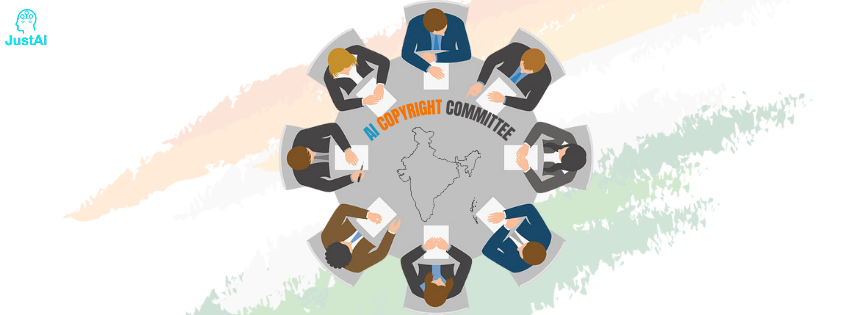A substantial progress highlighting the challenges of integrating artificial intelligence technology in the current legal framework has occurred, as a prominent member of India’s newly established AI copyright committee by the Department for Promotion of Industry and Internal Trade (DPIIT) seeks removal, citing a lack of expertise in AI. This step comes just ahead of the committee’s inaugural meeting, showcasing the urgent need for informed discussions on AI’s impact on copyright laws.
Formation of the AI Copyright Committee
On April 28, 2025, the Department for Promotion of Industry and Internal Trade (DPIIT), under the Ministry of Commerce & Industry, established a new committee with the objective of analyzing the legal and policy concerns arising from utilization of artificial intelligence technology in copyright matters. The key responsibility of the committee is to evaluate the competency of existing provisions of the Copyright Act, 1957, in addressing the issues by AI technology. The committee consists of legal experts, policymakers, and industry stakeholders who are given task of preparing a working paper which outlines the recommendations for potential legislative or policy changes.
Member’s Withdrawal Highlights Expertise Gap
A member from the committee, (chose to be anonymous), has raised apprehensions over having them included in the committee without prior consultation and expressed lack of expertise in the area of artificial intelligence. Further, the members have written a formal request to the DPIIT and requested their removal with someone who is an expert in artificial intelligence technology and given a statement that, “I am not an AI expert,” “I’ve written to DPIIT, but I haven’t received a response. I don’t understand why I was included in this committee in the first place”, shows their lack of interest and knowledge in this particular committee. This instance emphasizes upon relevance of including people with appropriate experience and interest which would intersect complex technological and legal domains.
Coinciding Legal Proceedings: OpenAI vs. ANI
The first meeting of the committee is scheduled for May 16, 2025, which coincides with a major judicial matter in the Delhi High Court. The case is regarding a news agency ANI who sued OpenAI, the inventor of ChatGPT, for allegedly utilizing its public content in training AI models without proper authorization. This case seems to be a major point of discussion in the committee’s meeting as it is directly concerns the intersection of AI, copyright, and legal reform. Notably, two committee members, Adarsh Ramanujan and Ameet Datta, are part of this case as amicus curiae and counsel for the Digital News Publishers Association (DNPA), respectively. The DNPA represents 21 media publishers, including Hindustan Times Digital.
Broader Context: AI and Copyright Challenges
The use of artificial intelligence technology for creating content and dissemination has raised alarming concerns worldwide about copyright infringement and the protection of intellectual property. In India, the Copyright Act, 1957 do not specifically address AI-generated works or acknowledge AI as an author. This ambiguity and vagueness in the existing legislation poses challenges in identifying authorship and ownership of AI-generated content. For instance, in a famous case, the Indian Copyright Office initially granted joint authorship to an AI tool named Raghav and its creator, Ankit Sahni, for an artwork. However, the office later issued a withdrawal notice, questioning the legal status of AI as an author and highlighting the need for legislative clarity in this domain.
India’s Path Forward: Legislative Reforms and Public Consultation
Recognizing the rapid advancements in AI technology and its implications for copyright law, Indian authorities are considering legislative reforms. The upcoming Digital India Bill is expected to address issues related to AI and copyright, aiming to secure the rights of content creators while fostering innovation. Experts advocate for extensive public consultation in this process to ensure that diverse perspectives are considered.
Conclusion
The resignation request from a member of India’s AI copyright committee highlights the complexities and challenges in aligning technological advancements with existing legal frameworks. As AI continues to evolve and permeate various aspects of content creation and dissemination, it is imperative for policymakers to engage experts across disciplines to craft informed, balanced, and forward-looking legislation. The outcome of the OpenAI vs. ANI case and the deliberations of the AI copyright committee will likely set significant precedents, shaping the future of AI governance and copyright law in India.
REFERENCES:
- https://www.indiatoday.in/law/story/chatgpt-ai-generated-content-copyright-ownership-complexities-india-2439165-2023-09-22?utm_source=chatgpt.com “Who owns AI-generated works? Here’s what the laws say on copyright issue – India Today”
- https://indianexpress.com/article/india/openai-case-indian-news-websites-copyright-9802312/?utm_source=chatgpt.com “Usage of copyright content: Digital news publishers join legal battle against OpenAI | India News – The Indian Express”
- https://legallyflawless.in/copyright-ai-redefining-authorship-digital-age/?utm_source=chatgpt.com “Copyright and AI: Redefining Authorship in the Digital Age – Legally Flawless”
- https://www.managingip.com/article/2a5bqtj8ume32iwlaoy5y/exclusive-indian-copyright-office-issues-withdrawal-notice-to-ai-co-author?utm_source=chatgpt.com “Exclusive: Indian Copyright Office issues withdrawal notice to AI co-author | Managing Intellectual Property”
- https://government.economictimes.indiatimes.com/news/governance/upcoming-ai-law-will-guard-rights-of-content-creators-experts/109178292?utm_source=chatgpt.com “Upcoming AI law will guard rights of content creators: Experts, ET Government”

